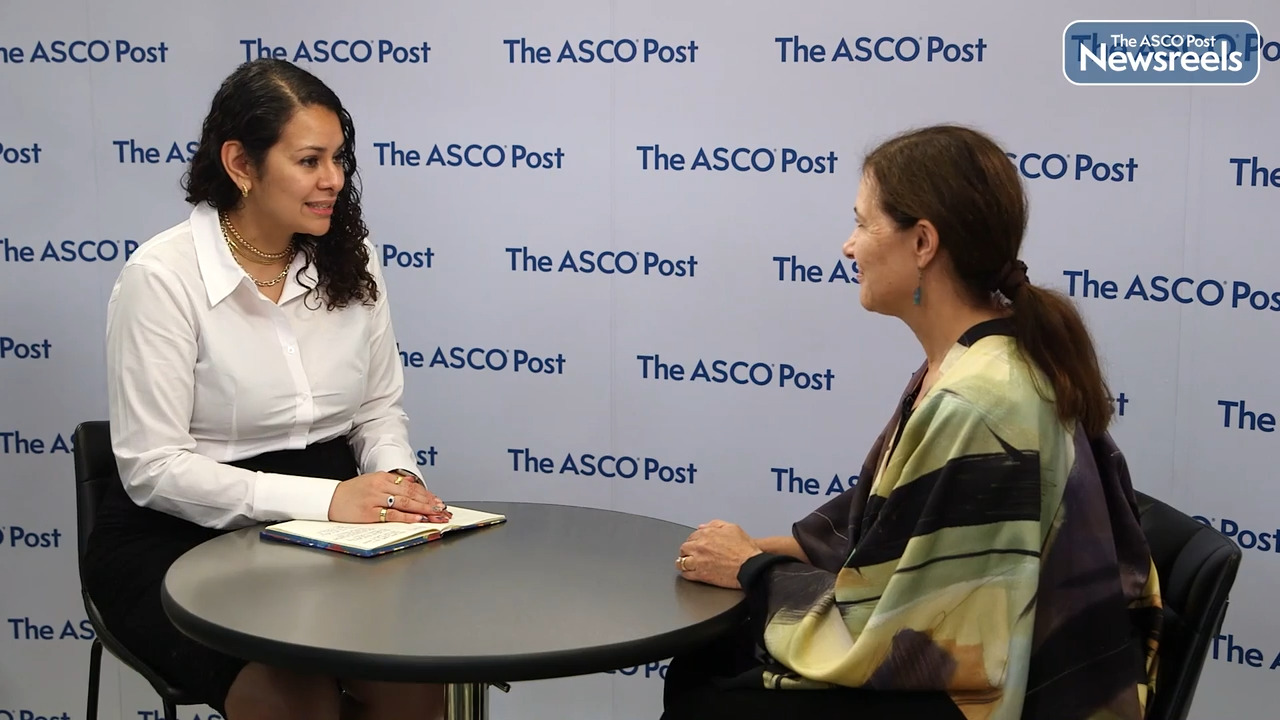Sebastian Stintzing, MD, on Colorectal Cancer: Influence of Liquid Biopsy in First-Line Combination Treatment
2023 ASCO Annual Meeting
Sebastian Stintzing, MD, of the Charité Universitätsmedizin Berlin, discusses results from the phase III FIRE-4 study, which showed that liquid biopsy is clinically relevant in verifying mutational status in patients with metastatic colorectal cancer and is efficacious in first-line treatment of FOLFIRI and cetuximab for patients with RAS wild-type disease (Abstract 3507).
Transcript
Disclaimer: This video transcript has not been proofread or edited and may contain errors.
The purpose of the FIRE-4 study was to test whether a switch maintenance from an anti-EGFR containing regimen first-line to bevacizumab plus [inaudible 00:00:19] would prevent upcoming RAS mutations as secondary resistant factors and therefore prolong progression-free survival over the median time that is reached with the standard treatment of FOLFIRI plus cetuximab. Therefore, we randomized 672 patients in either FOLFIRI plus cetuximab until progression or intolerable toxicity versus FOLFIRI cetuximab up to eight and 12 cycles, and then switch maintenance towards [inaudible 00:00:52] and bevacizumab.
Primary endpoint of the first line treatment was PFS and we have published this in last year, we did not reach a PFS. PFS of both arms was comparable. At this ASCO, we present the data of the liquid biopsy translational program. We took liquid biopsies at the beginning, at baseline, at the 6 to 12 cycles within treatment. And then at the end of the treatment, at progression. What was quite unexpected, this was a RAS wide type population by tissue-based testing within the liquid biopsy, we were able to find 13% of patients having a RAS mutation at baseline. And the outcome of those patients were as expected for RAS mutant patients. At PFS of roundabout nine months and overall survival of 22 months, whereas the double Y type population, the RAS and BUFY type population exceeded the PFS with 11.5 months and then overall exceeding in median 33 months.
We also had the on treatment measurement of liquid biopsy and was quite interesting. It took in median 48 weeks until the RAS mutation came up in those patient treated continuously with anti-EGFR treatment. Almost after one year of treatment, there were upcoming RAs mutations and we found those in round about 19%. One out of five patients got to this RAS mutation. It did not impact overall survival.
What are our conclusions here? First of all, baseline liquid biopsy is important to find the right patient population and to sort out those patient who may have a RAS wide type tumor by tissue-based analysis, but a RAS mutant tumor by liquid biopsy because those patients do not derive benefit from anti-EGFR treatment. At baseline it's important, it's meaningful. During treatment, we think there's no meaning for the RAS testing by liquid biopsy because those patients who actually got a RAS mutation during treatment have a very long treatment time, are on treatment for almost a year. And it has no impact on overall survival.
What would be the next steps? In my opinion, we should do a liquid biopsy in our clinical practice before starting anti-EGFR treatments or at baseline to cover tumor heterogeneity and to cover the real RAS mutational status of our patients that we want to treat. B, I think it'll be important to find a threshold during treatment where we can apply treatment holidays. Where's the threshold? How far can we actually treat the patients? How far can we shrink down the tumor volume until it is safe to say, okay, now we can do a treatment holiday, just to give the patient a break and from a patient perspective to have a better quality of life during this treatment course.
Related Videos
The ASCO Post Staff
Narjust Florez, MD, of Dana-Farber Cancer Institute, and Heather A. Wakelee, MD, of Stanford University, Stanford Cancer Institute, discuss new data supporting neoadjuvant pembrolizumab plus chemotherapy followed by surgery and adjuvant pembrolizumab as a promising new treatment option for patients with resectable stage II, IIIA, or IIIB (N2) non–small cell lung cancer (NSCLC) (Abstract LBA100).
The ASCO Post Staff
Muhit Özcan, MD, of Turkey’s Ankara University School of Medicine, discusses phase II findings from the waveLINE-004 study. It showed that the antibody-drug conjugate zilovertamab vedotin had clinically meaningful antitumor activity in patients with relapsed or refractory diffuse large B-cell lymphoma (DLBCL) who experienced disease progression after, or have been ineligible for, autologous stem cell transplantation and/or chimeric antigen receptor T-cell therapy (Abstract 7531).
The ASCO Post Staff
Arlene O. Siefker-Radtke, MD, of The University of Texas MD Anderson Cancer Center, discusses the combination of erdafitinib and cetrelimab, which demonstrated clinically meaningful activity and was well tolerated in cisplatin-ineligible patients with metastatic urothelial carcinoma and fibroblast growth factor receptor alterations (Abstract 4504).
The ASCO Post Staff
Alicia K. Morgans, MD, MPH, and Praful Ravi, MRCP, MBBChir, both of Dana-Farber Cancer Institute, discuss an individual patient-data analysis of randomized trials from the ICECAP collaborative. A PSA nadir of ≥ 0.1 ng/mL within 6 months after radiotherapy completion was prognostic for prostate cancer–specific, metastasis-free, and overall survival in patients receiving radiotherapy plus androgen-deprivation therapy for localized prostate cancer. These findings may help identify patients for therapy de-escalation trials (Abstract 5002).
Ajay K. Nooka, MBBS, of Winship Cancer Center of Emory University, discusses phase II findings showing that, in patients with high-risk myeloma, maintenance therapy with carfilzomib, pomalidomide, and dexamethasone deepened responses. Measurable residual disease negativity was attained in 80% of patients.




